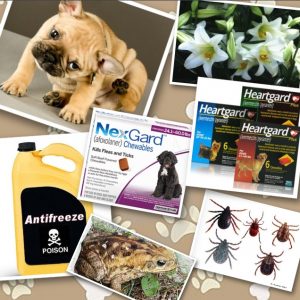
Dealing with Common Health Concerns for Goldendoodles
Goldendoodles are one of the most popular dog breeds right now – and for good reason! Their adorable teddy bear looks and sweet dispositions make goldendoodles amazing pets! But are there any downsides to this poodle mixed breed? Should goldendoodle health issues be a red flag?
Let’s take a closer look at the positives and negatives of this popular dog breed.
What are Goldendoodles?
Goldendoodles are a cross breed (or mixed breed) of a golden retriever and a poodle. Oftentimes, pet owners assume a mixed breed dog will combine the best of two or more breeds. This oversimplification is not always the case.
The way in which genes (genetic DNA from both parents) express themselves is not always subject to a breeder’s control. Just like many pure-bred dogs, goldendoodles tend to exhibit specific traits, personalities, behaviors, and health issues. But those traits are not a guarantee.
If you want to adopt a goldendoodle, consider all their common traits. Look at both the good and potentially bad, and know that you may or may not get what you ask for!
Common Personality Traits of Goldendoodles
- Intelligent – They are smart and learn quickly (early age socialization and positive training is key).
- Friendly – They make excellent therapy dogs because of their friendly demeanor!
- Affectionate and Loyal – Goldendoodles love snuggles and make wonderful companions for their owners.
- Moderate Activity Level – Larger goldendoodles tend to be more active. But all of them need a good walk/run or active playtime each day. This trait is great for families with kids! They are also athletic enough to participate in dog sports such as agility, flyball, obedience, and rally.
Typical Physical Traits of Goldendoodles
Size Matters
Goldendoodles come in a range of sizes:
- Miniature (15 to 30 pounds)
- Medium (30 to 45 pounds)
- Standard (45 to 100 pounds)
Friendly Vet Note: Goldendoodles are a cross breed; therefore, they do NOT have fixed traits. There is no guarantee the goldendoodle puppy you bring home will fall into the desired weight range despite a breeder’s assurance.
Dealing with Allergies
Poodles have a reputation for being some of the best dogs for people with allergies. They are considered hypoallergenic and are often tolerated well by people who are allergic to dogs. Since goldendoodles are a poodle mix, they are often promoted as being hypoallergenic as well.
However, there is no scientific evidence that any dog breed or cross breed is more or less likely to cause a reaction than any other dog. Human dog allergies are caused by a reaction to the dander and dead skin cells shed by all dogs. Some dog owners with mild allergies may react less severely to “hypoallergenic” dogs, but no reputable breeder will guarantee their dogs are hypoallergenic.
Fur Real Truth
Goldendoodles can have different types of fur. Some have shaggy fur coats like a golden retriever, while others resemble their poodle ancestors with loose curls. Many fall somewhere in the middle.
One thing that is guaranteed is that their fur coats require regular maintenance and upkeep. Plan to brush your goldendoodle at least every other day using a slicker brush for dogs. You should have your goldendoodle professionally groomed every 8 to 12 weeks.
Goldendoodle Health Issues – Be Mindful of Potential Concerns
You may find it interesting that goldendoodles can develop health conditions common to both golden retrievers and poodles!
But aren’t mixed breeds supposed to be healthier?!
Yes, generally speaking. But since goldendoodles are a mixture of two pure-bred dogs, the health issues of either breed may be passed down.
Goldendoodle health issues may include but are not limited to the following concerns:
- Hip dysplasia – abnormal development and growth of a dog’s hip joint
- Sebaceous adenitis – inflammatory skin disease focusing on the sebaceous glands
- Sub valvular aortic stenosis (SAS) – one of the most common congenital heart defects of dogs
- Addison’s disease – adrenal glands don’t produce adequate levels of corticosteroid hormones (hypoadrenocorticism)
- Eye diseases – progressive retinal atrophy, cataracts, and glaucoma
- Ear infections – due mainly to trapped moisture
- Skin allergies – generalized itchiness and secondary skin infections
Friendly Vet Note: When getting a goldendoodle from a breeder, you should request some paperwork regarding the health of your new puppy.
The breeder should provide evidence that both the puppy’s parents have hip certifications from the Orthopedic Foundation for Animals, an OFA heart clearance, and certification from the Canine Eye Registry Foundation that the eyes are healthy. It would be an added bonus to also have an OFA elbow clearance for standard goldendoodles, an OFA knee clearance for small or medium goldendoodles, and a DNA test for progressive retinal atrophy.
For more information, see the Red Ribbon and Blue Ribbon requirements set by the Goldendoodle Association of North America.
Pet Insurance for Goldendoodles
Regardless of the breed of dog you choose, pet ownership is a huge responsibility – both timewise and financially. While adjusting schedules to include a new pup comes as second nature to many, thinking about affordable pet care options is often something new pet owners overlook.
But the good news is that you CAN prepare for some of the financial responsibilities of pet ownership!
Pet insurance for dogs can be a helpful tool in keeping your new family member in tip top shape! The very best time to invest in a pet insurance plan for your goldendoodle is as a healthy puppy. You can’t predict the future, but having pet insurance is one thing you can do to help alleviate financial burdens of goldendoodle health issues later in life.
Purchasing pet insurance for puppies, before any common goldendoodle health issues arise, can help protect you from potentially expensive veterinary bills. Pet insurance can also provide financial coverage for the wellness preventative care of your pet (yearly bloodwork, vaccinations, routine dental cleanings). These regular visits can also be expensive over your pet’s lifetime. Investing in a pet insurance plan, like Spot Pet Insurance, while your furbaby is still young helps you to do whatever your pet will need over their lifetime without financial constraints and limitations.
Final Thoughts on Goldendoodle Best Traits and Health Issues
Goldendoodles are loving, affectionate, intelligent, and loyal companions. They will provide their families years of unfaltering love and happiness.
Be aware of possible goldendoodle health concerns, ensure your goldendoodle puppy is from a reputable breeder with evidence of good health from both parents, and purchase pet health insurance early on to set you and your pup up for a long life of health and wellness!




